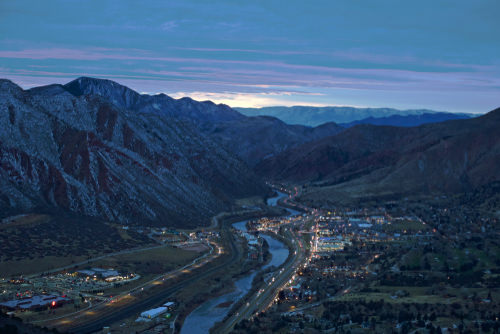The sun was starting to peek out around lunchtime at the COVID-19 testing kiosk at the Teton County Library, and folks were trickling in for a variety of reasons.
“To be honest, this is the first time I think I’m actually feeling any symptoms,” said Sheryl Newton, manager of the Aspen Meadows apartment complex.
“Somebody tested positive in my office today. So, that’s why I’m here,” said Corrina Dorman, a recorder for Teton County.
There are 651 active COVID-19 cases in the valley as of press time—still the highest rate per 100,000 people in Wyoming and one of the highest rates in the country. Sickness and quarantines are impacting local schools, ski resorts and nearly every business in town. For the first time in several months, the virus is prevalent in the everyday lives of residents.
“I don’t want to be part of the cause. I want to be part of the solution, you know, and help keep our town open because we so much depend on the tourism here,” Newton said.
“We have two very young kids who are both in daycare. So, every time it’s actually stressful because nearly every week there’s a new report of some other child getting sick. So, it’s always a worry that maybe our kids pick it up,” said local resident Gesche Nemitz.
“I don’t want to worry about it because I’m diabetic. And when you have an underlying condition, it really can be bad,” Dorman said.
One silver lining, if you can call it that, is that Teton County isn’t alone, even by regional standards. Jonathan Godes is mayor of Glenwood Springs, Colorado, a mountain town between Vail and Aspen. He went to the local ski hill with his daughter in early January only to find half the lifts closed due to staff being out with COVID exposure.
“We in the mountain communities had to grapple with it several weeks before other communities. So, we had a head start on it,” he said. “Because of the service sector—the people who are cleaning the hotel rooms, people that are waiting on tables, those kinds of people do not have the ability to work from home and to stay isolated.”
In the West, the counties with the highest #COVID case rates in their states are all very touristy.
CO: Pitkin (Aspen)
UT: Summit (Park City)
ID: Blaine (Sun Valley)
MT: Gallatin (Bozeman)
WY: Teton (Jackson Hole)3 of these places are top 5 per capita in the country. pic.twitter.com/0IOVoDglMW
— Will Walkey (@WillWalkey) January 11, 2022
Blaine County, the home of Sun Valley, was the first to experience a surge in new cases in Idaho. And Gallatin County, where Bozeman and Big Sky are located, is currently leading Montana.
Meanwhile, Godes said visitor numbers—and sales tax revenue—have been breaking records in his county ever since the pandemic began. The stresses that come with increased tourism, now exacerbated by the recent Omicron surge, haven’t gone away yet.

COVID-19 cases in Glenwood Springs, Colorado, peaked in early January but have started to subside. (Rick Chao/Shutterstock)
“I worry about just kind of community fatigue. I worry that, you know, we thought we were done when the vaccines came out. We really did,” Godes said. “We didn’t know how politicized vaccines would be.”
Hospitals in major resort areas throughout the region have remained stable thus far. There have been no crisis standards of care enacted and no troubles with transferring folks with serious cases to bigger hospitals in Denver or Salt Lake City, according to Dr. Paul Beaupre, former CEO of St. John’s Health in Jackson. Beaupre said staffing and getting the latest treatments to the area have been recent challenges, but not ICU or bed capacity.
“It’s not really a health care crisis any longer. It is very disruptive to the community, but it’s, again something that will help us ultimately learn how to live with it,” he said.
Teton County has by far the highest vaccination rate in the Cowboy State, at around 87% of residents, according to state department of health data.* Similarly, Summit County, the home of Park City, leads in Utah, and Colorado’s most inoculated towns include Telluride, Steamboat and Breckenridge.
Beaupre said that’s certainly a factor as to why mountain towns haven’t seen hospitalizations and deaths increase this year at the same rates as elsewhere across the country.
“We got out ahead of this pretty well. We started home testing right away. We started going to virtual visits. We began to socially distance early on. We asked for help with masking early on,” he said. “So, I think, as a community, we really have done the right thing.”
Beaupre also said people in resort communities tend to be healthier on average than surrounding communities, and, someday, he hopes there’s a study about how living at altitude affects COVID-19 symptoms. In the meantime, he thinks people should continue to listen to guidance from local healthcare experts.
“I’ve almost in many ways tuned out the messaging nationally at this point, and believe what we’re doing locally is the right approach,” Beaupre said. “And we should continue doing that in the spirit of cooperation and not in the spirit of animosity.”
Beaupre also said he thinks COVID case numbers should begin to decline by mid-February, and he’s crossing his fingers that hospitalizations remain low. Still, he predicts Omicron will continue to disrupt the local economy in the coming weeks.
The prevalence of home testing, or people just staying home and not testing when they get sick, means there’s also likely an undercount in the official case numbers in Jackson Hole.
Editor’s Note 1/23: The radio version of this story notes a higher active case rate in Teton County, but numbers have already gone down since KHOL has published this piece on the web, so we’ve updated it to reflect the most current figure.






